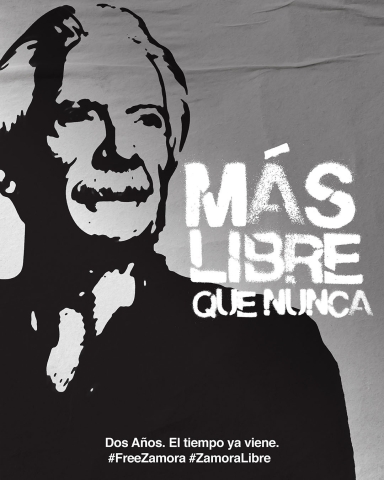
Jose Rubén Zamora begins each day at the mercy of his jailers.
Over the past two years, the award-winning journalist has been isolated in an insect-infested cell, deprived of water, light and sleep as part of his punishment. He has endured “humiliating rituals” and moments when he feared for his life, said his son, Jose, in a recent interview.
Jose Zamora described middle-of-the-night raids by masked guards and dogs entering the small cell and “turning everything upside down.” He told of his father being jolted awake by shouts of profanities and threats and days spent in darkness. “It was all because of his journalism,” Jose said from his home in Miami.
Zamora, 67, founder of the newspaper elPeriódico, was arrested on July 29, 2022, on trumped up charges of money laundering, payback for hard-hitting reporting on the alarming level of corruption in Guatemala, some linked to former President Alejandro Giammattei and his cronies. The newspaper closed in May 2023 due to legal harassment and financial difficulties.
ICFJ has been a leading voice demanding Zamora, one of Central America’s most celebrated journalists, be released. He is a winner of the prestigious ICFJ Knight International Journalism Award. Upon his conviction, 25 fellow ICFJ Knight Award winners wrote to demand his freedom.
“Jose Rubén Zamora has now been behind bars for two years, a dark milestone that should never have come to pass,” ICFJ President Sharon Moshavi said. “He is being held in deplorable, inhumane conditions, and his continued imprisonment is a clear assault on press freedom. Journalism is not a crime, and it should never be treated as such.”
ICFJ reported more than 750 attacks on journalists had been recorded under Giammattei’s regime. The global demand for Zamora’s release might be taking hold.
According to his son, starting in January, Zamora’s treatment has improved. He is being held in the same place, but the constant harassment ended when Giammattei left office.
“Some of the changes have been small but have dramatically changed his life. He only had very cold water in the shower. They allowed him to have a small water heater, so now he has warm showers. He is getting more access to the sun. It really helps,” said Jose, who sits on ICFJ’s Board of Directors.
Among other hopeful signs, in July the United Nations Working Group on Arbitrary Detention declared Zamora’s imprisonment a violation of international law and called for his immediate release. Last October, a Guatemalan appeals court overturned Zamora’s conviction and ordered a retrial, sending it back to the High Court. The case has been bogged down by delays.
Accolades during his career attest to Zamora’s prominence in the journalism community. Zamora won this year’s prestigious Gabo Award for Excellence, the highest recognition for journalism and freedom of expression granted by the Gabo Foundation in Bogotá, Colombia. (The award and foundation are named for Nobel Prize-winning writer Gabriel García Márquez.) In bestowing the award, the Governing Council sought “to honor the 30-year career of the founder and director of Guatemala’s most important investigative media outlet, and to call for the defense of good journalism embodied by Zamora.”
The ICFJ Knight Award winner also was named one of 50 World Press Freedom Heroes of the 20th century by the International Press Institute..
Guatemala’s new president, Bernardo Arévalo, ran for office on an anti-corruption platform. Jose Zamora is planning to visit him to plead his father’s case. He says that so far, the new administration is not attacking the press.
“I am amazed that even in an environment of fear and prosecution [under the last regime], journalists continued to do their jobs. There still is a lot of competition, but I’ve seen a lot of collaboration and solidarity,” said Jose Zamora.
After being led away in handcuffs, his father wrote his final editorial for elPeriódico. “Despite the fatigue, the severe adverse conditions, the humiliation and the derision, I will not cease in my fight for freedom and democracy in Guatemala,” he wrote from behind prison walls. Those words ring true as supporters continue to fight for his release.
Learn more: https://www.zamoralibre.com/.